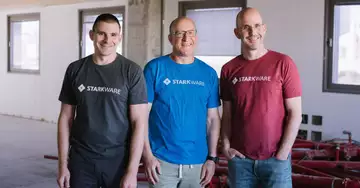StarkWare Industries, which provides solutions to make blockchain technology more scalable, has received $100 million in a Series D funding round at a valuation of $8 billion, up from $2 billion in its last capital raise in November.
The round was led by investment firms Greenoaks Capital and Coatue, and other participants included Tiger Global, according to a press release obtained by CoinDesk. The capital, which also included an undisclosed amount of employee stock sold in a secondary transaction, will be used for product and business development, engineering and expansion of the surrounding ecosystem, StarkWare CEO Uri Kolodnytold said in an interview with CoinDesk.
Significantly, he closed nine-figure deal during a crypto bear market. According to Kolodny, StarkWare and its backers are less focused on the current prices of tech stocks or cryptocurrencies and more focused on "building for the long haul."
What StarkWare does
StarkWare's technology addresses scalability issues on the Ethereum blockchain that cause slow throughput and increase gas or transaction fees. The company has two platforms. The scalability engine, StarkEx, which the company says handles more transactions per month than the bitcoin network, powers the Immutable X platform for non-fungible tokens (NFT) and the decentralized exchange dYdX, among others. The second platform, StarkNet, launched in February and puts blockchain scaling technologies in the hands of developers building decentralized applications.
"High transaction fees and limited bandwidth on blockchains today inhibit the mass adoption of cryptocurrencies," Luca Schmid, general partner at Coatue, said in the press release. "StarkWare solves this problem with Validity Rollups, which we believe will enable blockchain apps to seamlessly serve millions of customers."
StarkWare Rollups
Rollup technologies cluster hundreds of transactions outside the main Ethereum blockchain to reduce computational load. Optimistic rollups use a network of validators to verify that the data in the bundle is legitimate, meaning transactions can be challenged and temporarily prevented from reaching Ethereum. Zero Knowledge (zk) rollups, also called validity rollups, use cryptography to mathematically validate the transaction bundle before it reaches Ethereum.
StarkNet, zkSync, and Aztec offer zk rollup solutions. StarkWare's offering uses a cryptographic method called STARKs, which was developed by Eli Ben-Sasson, co-founder and president of the company, along with other computer scientists.
"What our technology delivers - and it delivers through math - is integrity at scale. And C.S. Lewis defined integrity very nicely as 'doing the right thing even when no one is watching,'" Ben-Sasson told ConDesk. "Our technology uses math to assure the blockchain that a large amount of off-chain transactions have been calculated with integrity."
StarkWare's near-term plans include decentralizing StarkNet. Kolodny declined to comment on whether the process would involve a token.
"We hope to be very, very far down the path to full decentralization within the next year, if not already there," he said.
StarkWare's recent capital raise is the latest signal that venture capitalists are betting big on rollup technologies. Last fall, investment giant Andreessen Horowitz (a16z) led a $50 million funding round for zkSync inventor Matter Labs. And in March, a16z participated in the $150 million funding round for optimism rollup provider Optimism at a $1.65 billion valuation.

